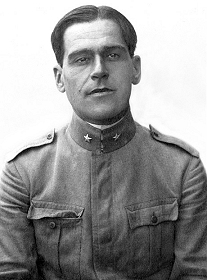Raffaele Rossetti

Raffaele Rossetti(12 July 1881 – 24 December 1951) was an Italianengineerand militarynaval officerwho sank the oncemain battleshipof theAustro-Hungarian Empireat the end ofWorld War I.[1]He was also a politician of theItalian Republican Party.
Biography
[edit]Born inGenoa,Raffaele Rossetti graduated as anengineerfrom theUniversity of Turinin September 1904. He went to study at theItalian Naval AcademyofLivorno,where he became alieutenantfor the Italian Navy Engineering Corps.
In December 1906 he graduated in "naval mechanical engineering" at thePolitecnico di Milano.
In 1909 he was promoted tocaptainand in 1911 went toLibyaduring theItalo-Turkish Warwith the cruiserPisa.During the first years ofWorld War Ihe worked as the Director of the Navy Arsenal inLa Speziaand was promoted tomajor.
While working there he started creating a new weapon, based on his idea of atorpedomanned by a person, to be linked to enemy vessels underwater and explode under theship hull.This weapon was calledmignatta(it) ( "leech" ) and was the precursor of themaialeofWorld War IIand the actual "human torpedo".

On 1 November 1918, together withRaffaele Paolucci,Rossetti used hismignattato assault the former Austrian battleshipViribus Unitis,which, unknown to them (the transfer had taken place a few hours before the action, whenLuigi Rizzohad already left his base) had already changed hands to the newly establishedState of Slovenes, Croats and Serbsand been renamedJugoslavija.After entering Pola harbour undetected, Rossetti and Paolucci placedlimpet minesbelow the hull of the battleship; they were discovered and captured, and informed the crew that the ship was going to sink, however they did not reveal that they had placed mines on the hull. The explosions were delayed, and the crew started reboarding the ship, believing they were lying. Shortly thereafter, the mines exploded, causing theJugoslavijato capsize and sink, with heavy loss of life. Rossetti and Paolucci were awarded the ItalianGold Medal of Military Valor.[2]This event is generally known as theRaid on Pula.
In 1919 Raffaele Rossetti retired ascolonel.With the advent ofItalian Fascism,he became a member of theItalian Republican Party(PRI). He also founded theAnti-fascistmovementItalia liberatogether withGiovanni Conti,Randolfo Pacciardiand others. In 1925 he was assailed by Fascist squads, and decided to move to France. Here he was part of the directive ofGiustizia e Libertà,an anti-fascist movement of Italian activists inParis.In 1930 he left the movement and, together withCipriano Facchinetti,founded another anti-fascist movement,La Giovine Italia.In 1932 he was elected secretary of the exiled PRI, but the following year he was replaced by Pacciardi.
During theSpanish Civil War,Rossetti moved toBarcelona,and collaborated with local radio stations by running anti-fascist slogans. In retaliation, the Italian government revoked his Gold Medal won during World War I. This measure was annulled after the Fascist government was ousted and Italy became a Republic after the end ofWorld War II.
He died inMilanin 1951.
See also
[edit]Notes
[edit]Sources
[edit]- The Fate of the Viribus Unitisby Raffaele Paolucci. in "The Fortnightly Review" (New York), Vol. 105, 1919, 977-988.
- The Sinking of the Viribus Unitisby Raffaele Rossetti. in "Great Moments of Adventure". edited by Evan J. David. Duffield and Co., 1930.
